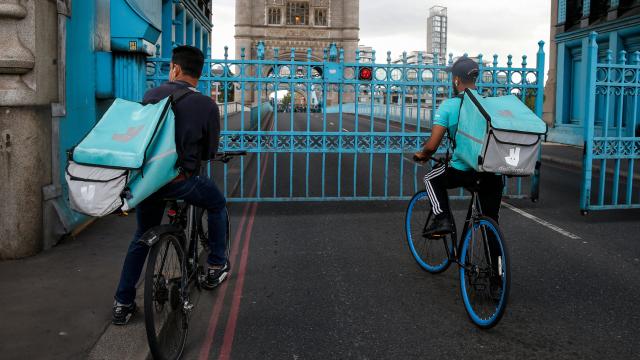Deliveroo, one of the most popular food delivery apps in the UK, will be listed on the London Stock Exchange for the first time next month. But at least two British investment firms have come forward to say they won’t be investing in Deliveroo over concerns about the company’s treatment of gig economy workers.
Aberdeen Standard and Aviva have both announced that they won’t be investing in Deliveroo, despite plenty of buzz about the company’s initial public offering in the UK in April. Deliveroo, which currently operates in 12 markets, including its home market of the UK, received a huge investment from Amazon in 2019.
“As long-term investors, we’re looking to invest in businesses that aren’t just profitable, but are sustainable – employee rights and employee engagement are an important part of that,” Andrew Millington, Head of UK Equities at Aberdeen Standard Investments, told Gizmodo via email.
“Our clients’ expectations of how we incorporate ESG into our decision making have changed hugely over the last decade and so we feel our clients are supportive of our approach,” Millington continued. “We will not be taking part in the Deliveroo IPO as we are concerned about the sustainability of the business model, including but not limited to its employment practices, and also the broader governance of the business.”
Aviva CEO David Cumming made similar statements on the BBC’s Today show on Wednesday, noting that delivery workers for Deliveroo in the UK don’t currently get access to things like paid vacations or the minimum wage.
“A lot of employers could make a massive difference to workers’ lives if they guaranteed working hours or a living wage, and how companies behave is becoming more important,” Cumming told BBC’s Today.
A spokesperson for Deliveroo in the UK, Romilly Dennys, told Gizmodo via email that plenty of other investors are interested in the company’s IPO next month.
“We are proud to provide work for 50,000 riders in the UK and that thousands more people apply to work with us every week,” Dennys wrote. “There has been a strong investor interest in our planned IPO and we are already backed by some of the most respected global tech investors.”
Dennys also pointed to the “self-employed” nature of gig economy work, presenting it as a positive, rather than a necessary evil of a tenuous labour environment for workers.
“Deliveroo riders are self-employed because this gives them the freedom to choose when and where to work,” Dennys continued. “We are confident in our business model, which has been upheld by UK courts three times, including the High Court twice.”
But before you think these big investors are just not investing in Deliveroo solely on principle, it’s important to note one curious thing Aviva’s CEO told the BBC yesterday. Cumming said that it was bad riders weren’t yet treated as workers with the same rights as full time employees, but also was quick to point out how giving them those things could be bad for the company’s bottom line.
“It’s an investment risk if the legislation changes,” Cumming said.
